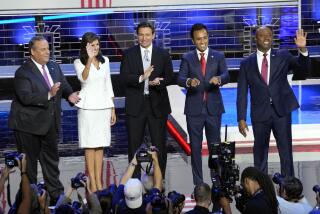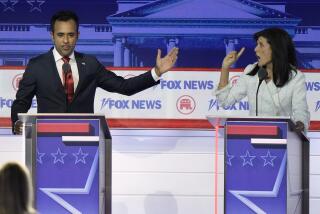At third debate, the Romney doctrine sounds like the Obama doctrine
- Share via
If the final debate Monday between President Obama and his GOP rival, former Massachusetts Gov. Mitt Romney, had a familiar feel, that’s because the candidates rehashed so many of the same arguments they’d made about domestic policy in the previous two sessions. Plus, they recycled some of the strategies used in Rounds 1 and 2: Obama again showed the assertive, critical style he displayed in the second debate, and Romney demonstrated the more accommodating, reactive style that Obama used, disastrously, in the first debate.
In fairness to Romney, he didn’t do as badly Monday as Obama did on Oct. 3. But he let too many of Obama’s points go unchallenged, particularly when Obama made the case (which he did repeatedly) that Romney had shifted positions more often than a weather vane.
The challenge for Romney going into the debate was to dispel the impression that his approach to foreign policy isn’t all that different from Obama’s. Instead, on such issues as Syria, Iran and China, Romney endorsed many of the steps Obama has been taking. His arguments boiled down to asserting that he’d be a stronger and more credible leader, without laying out much of a case for his ability to do so.
ENDORSEMENTS: The Times’ recommendations for Nov. 6
Romney scored points, though, when he pointed out that the world seems to be at least as threatening today to American interests as it was when Obama took office. Although the president can claim some notable achievements, such as withdrawing the troops from Iraq and killing Osama bin Laden and many of his top deputies, Israel and Palestine seem no closer to peace, Syria is a bloody mess, Iran’s nuclear ambitions seem undiminished, North Korea seems every bit as unstable, and the Russian leadership seems nostalgic for the tensions of the Cold War.
Still, Obama made a forceful case that Romney lacked a coherent, consistent vision for how to conduct foreign policy. He also had a wicked rebuttal to Romney’s criticism about defense budget cuts. When Romney complained that the Navy had fewer ships and the Air Force fewer planes than before, Obama said, almost incredulously, “Governor, we also have fewer horses and bayonets because the nature of our military has changed. We have these things called aircraft carriers where planes land on them.”
That kind of sarcastic zinger can backfire, and Republicans were counting on service members to take umbrage. Yet that line isn’t likely to incite many voters who weren’t already in Romney’s camp.
PHOTOS: Six numbers to ignore from the presidential campaign
The same could be said for the proceedings as a whole. As surprisingly deferential as Romney was, Obama didn’t seem to strike any knockout blows. The biggest problem for Romney is that his policy recommendations were so similar to Obama’s, he seemed to burnish Obama’s foreign policy credentials rather than using episodes such as the Benghazi embassy controversy to raise more doubts about Obama’s leadership.
Perhaps Romney’s main goal was to persuade voters that he’s not a warmonger and is no less interested than Obama in pulling troops out of Afghanistan by the end of 2014. That’s an image Obama and Vice President Biden have tried to advance, and Romney effectively rebutted it Monday. In doing so, though, he made himself seem yet more like the incumbent.
ALSO:
McManus: Applying the ‘ground game’
Is Defense of Marriage Act ruling too favorable?
Follow Jon Healey on Twitter @jcahealey
More to Read
A cure for the common opinion
Get thought-provoking perspectives with our weekly newsletter.
You may occasionally receive promotional content from the Los Angeles Times.











